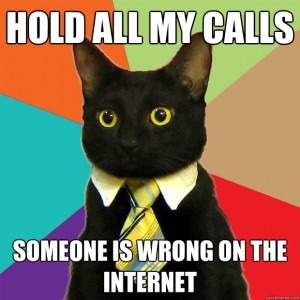When Politics Get Personal
Writers are an expressive lot, and like any group of human beings, they have politics. I am always a little surprised when an action writer is anything other than a conservative or libertarian, to be honest, but I recently found out one of the long-time writers of a series to which we’ve both contributed is such an ardent left-winger that he’s actually said Republicans should die. There are plenty of authors whose left-of-center politics are well known, such as John Scalzi or George R.R. Martin. The recent flap over the Hugo Awards and the “Sad Puppies” campaign highlighted some of the more right-of-center authors out there.
I don’t think any author whose politics lean left has ever worried that he might miss out on an opportunity, a review, or a fair shake because of those politics, but I know there are conservative and libertarian authors who have. That’s just the nature of the industry. If your politics are “wrong,” there are outlets, big outlets, that won’t want to touch you. You can either downplay your politics or you can be out and proud, but if you choose the latter, you have to live with the consequences.
Most of the time, though, where you’re going to encounter politics with fellow authors (or with family, or with anyone else) is on social media. Recently, on Facebook, an author whose work I love told me that he wanted pit bulls to rip my testicles off (among other exhortations). This was after he told a reader — a fan of his — that he wanted that fan’s children raped. All of this came about because the author in question disagreed with a political opinion of mine. It also wasn’t the first time I had expressed an opinion only to have him call me out personally, to accompanying profanity so complex and richly textured that only an author of great experience could have thought it up.
I try to be very patient with people, although I’m not always successful. In the case of this fellow, I’ve admired his work for years. He is an immensely talented guy. Unfortunately, he doesn’t handle political disagreement well. He got angry and attacked me personally. When I told him that doing so would be deleterious to our friendship, he told me to go to hell (again, among other exhortations). He had made his position clear: We could not be “Facebook friends.”
What’s sad about these types of interactions is not merely that they are unnecessary. If you disagree with someone’s opinion politically, you can choose to ignore it or you can disagree politely. If the two of you go on disagreeing politely, you might just have an interesting conversation. Most of the time on social media, though, people get angry and their disagreements turn into spats. When we don’t respect each other’s boundaries, those spats become feuds and those feuds become bitter resentments.
How does this affect you as a writer? Well, it’s a fact that you’re better off not discussing politics. You enjoy the most advantages, for your career and for your professional life, if people focus on your work and not on you as a person. If you are already associated with your politics to a high degree, acknowledge at the outset that it is inescapable. Don’t emphasize it on your website or in your blog. If you must talk politics on social media, have a long fuse and be patient with people. Give them plenty of chances to back away from affronts and to reconsider their positions.
If you respect yourself, however, you must also terminate social media connections with people who disrespect you personally and repeatedly. People will take as much power in a relationship as you give them. If you teach them that they can abuse you personally and repeatedly, that is what will occur. When I find that a social network connection is untenable, I delete it, with no grudges held and no hard feelings.
If the author in question comes up in the future, I will continue to recommend his work. If I have the opportunity to work with him in the future on a project that is not political, I will not let his anger toward me interfere. What I won’t do, however, is permit repeated and personal disrespect — and neither should you. If you’re going to be a writer and you’re going to use social media, you have to set and enforce boundaries. Expecting civility and respect, requiring people to treat you as you treat them, is not at all unreasonable. It is a good standard to set and meet… and it requires diligent enforcement.
To sum up, avoid politics if you can. It only detracts from your non-political writing. If you must discuss politics, do it on social media, not your professional blog or website. If you come into conflict with other writers or with readers who disagree, be patient and kind while giving them every chance to back away from disrespect. As a last resort, terminate the connection without prejudice. Set this as your goal and shoot for it. You may not always meet it, but you should aspire to do so.



Because you simple used the name “Doug” in all your responses to Mr. [redacted] I received a notice that I had been “tagged” in one of your posts. I read the exchange with a certain morbid fascination. The imaginative vitriol thrown in your direction was as impressive as it was uncalled for. I applaud your incredible patience during the tirade and your magnanimous attitude in this column. I salute you sir.